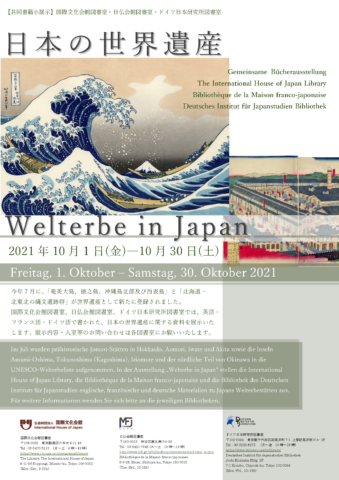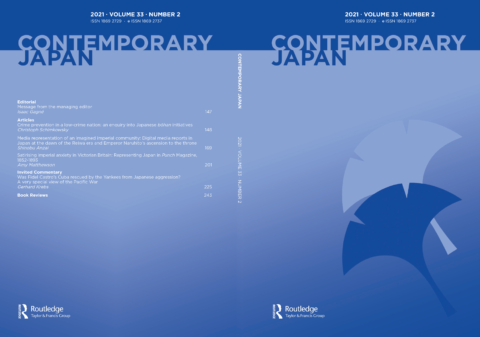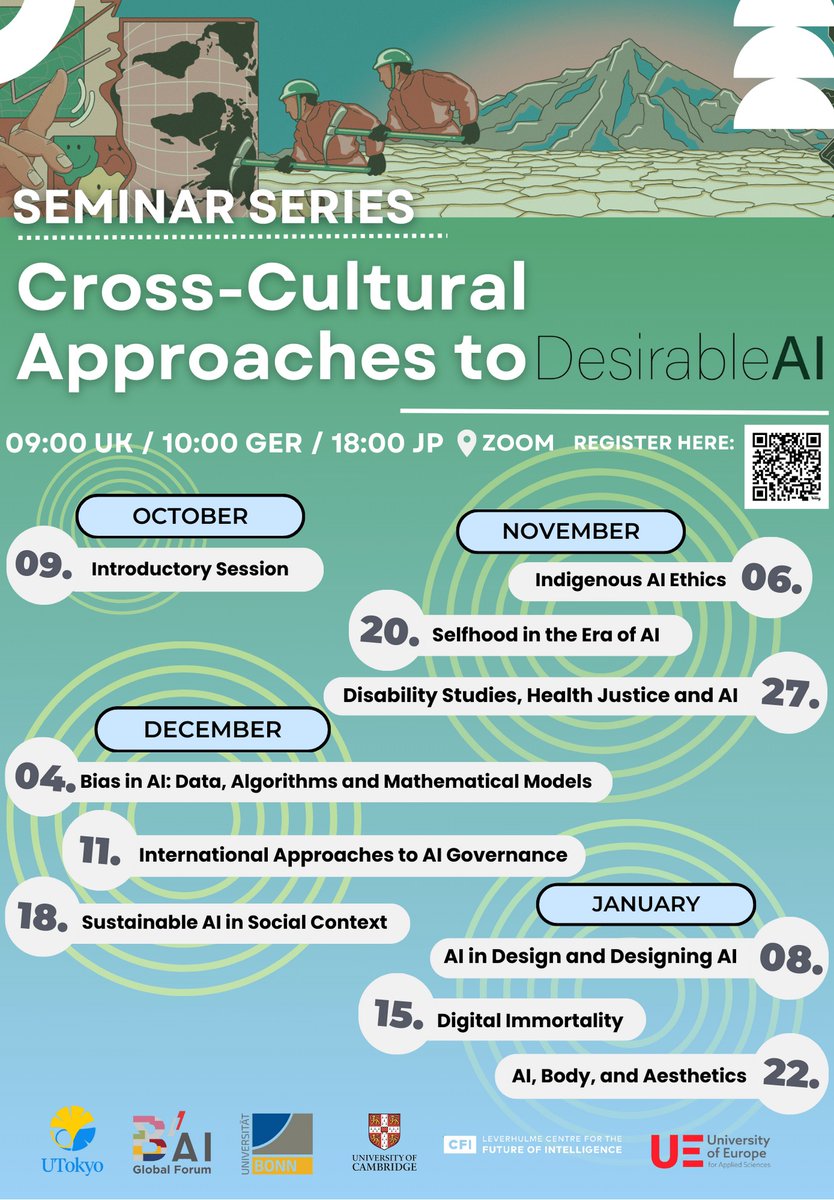Events and Activities
Film screening and discussion with filmmaker Thomas Ash: ‘Ushiku’ – fully booked –
 In cooperation with the Friedrich-Ebert-Foundation and the OAG Tokyo, the DIJ organizes a special preview screening of the film Ushiku on November 19, ahead of its Japan theatrical release. The screening at the OAG House Tokyo will be followed by a discussion with director Thomas Ash, several protagonists, and human rights expert Ai Kihara-Hunt (University of Tokyo). The film takes viewers deep into the psychological and physical environment inhabited by foreign detainees in one of the largest immigration centres in Japan. On the eve of Japan’s recent immigration reform efforts, the director bypasses the media blackout the government has imposed on its immigration centres, bringing viewers into immediate contact with the detainees, many of whom are refugees seeking asylum. The event will be moderated by DIJ principal researcher Nora Kottmann. Please note: Due to the COVID-19 pandemic special rules for attendance apply. This event is fully booked. We regret that registration is no longer possible. Details here
In cooperation with the Friedrich-Ebert-Foundation and the OAG Tokyo, the DIJ organizes a special preview screening of the film Ushiku on November 19, ahead of its Japan theatrical release. The screening at the OAG House Tokyo will be followed by a discussion with director Thomas Ash, several protagonists, and human rights expert Ai Kihara-Hunt (University of Tokyo). The film takes viewers deep into the psychological and physical environment inhabited by foreign detainees in one of the largest immigration centres in Japan. On the eve of Japan’s recent immigration reform efforts, the director bypasses the media blackout the government has imposed on its immigration centres, bringing viewers into immediate contact with the detainees, many of whom are refugees seeking asylum. The event will be moderated by DIJ principal researcher Nora Kottmann. Please note: Due to the COVID-19 pandemic special rules for attendance apply. This event is fully booked. We regret that registration is no longer possible. Details here
Franz Waldenberger moderates digital currencies panel at virtual GoN-summit

DIJ director Franz Waldenberger will moderate the panel “Digital Currencies – European and Japanese Initiatives” at the Group of Nations ‘Solutions through Inclusivity’ virtual summit on November 17. Together with panelists Andrea Pinna (ECB), Jonas Gross (Frankfurt School Blockchain Center), Hiromi Yamaoka (Future Corporation), and Nobuyuki Kinoshita (Tokyo Financial Exchange), he will discuss how digital currencies are changing the future of financial systems in the digital age. The panel will introduce major findings of the open access book publication The Future of Financial Systems in the Digital Age: Perspectives from Europe and Japan, edited by Markus Heckel and Franz Waldenberger. It is forthcoming from Springer Singapore in 2022 and contains chapters by leading scholars, policymakers, and regulators from Japan and Europe, including the editors as well as panelists Jonas Gross, Hiromi Yamaoka, and Nobuyuki Kinoshita. Registration for the virtual summit is open here
Germany’s new Ambassador to Japan visits DIJ

On October 20, Germany’s new Ambassador to Japan, Clemens von Goetze, visited our institute. He was accompanied by Lothar Mennicken, the Embassy’s Counsellor for Science and Technology. DIJ director Franz Waldenberger, deputy director Barbara Holthus, and administrative director Joachim Röhr informed the Ambassador about the institute’s ongoing research activities. Franz Waldenberger also presented the Ambassador with a selection of latest DIJ publications. The Ambassador expressed great interest in the DIJ’s expertise in different aspects of contemporary Japan, in particular society and politics. Before assuming his current post, Clemens von Goetze was Germany’s Ambassador to Israel (2015-18) and to the People’s Republic of China (2018-21). We are very pleased and honoured that Ambassador Goetze took the time to visit our institute one day before presenting his credentials to the Emperor at the Imperial Palace. Photo (left to right): Joachim Röhr, Franz Waldenberger, Barbara Holthus, Clemens von Goetze, Lothar Mennicken.
New DIJ Monograph compares wartime photography in Germany and Japan

Spiegel-Bilder. Die Darstellung von Kindern und Jugendlichen in Illustrierter Beobachter und Shashin shūhō, 1938 und 1943 by Lukas Frank is the latest addition to our DIJ Monograph Series. Frank’s book compares patterns of pictorial representations of children and youth in German and Japanese press photography of the late 1930s and early 1940s on the basis of two important illustrated magazines of the time: the Illustrierter Beobachter and Shashin shūhō (写真週報, Photographic Weekly). The study shows similarities and differences of pictorial propaganda in both countries, explains general trends in the design of propaganda, and analyses the organisation and function of propaganda in radical nationalist states. Connections between German and Japanese photography and their influences on the pictorial propaganda of the magazines are also addressed, as are representations of Germany on the Japanese side and of Japan on the German side. Details
Autumn issue of DIJ Newsletter published

We have just published the autumn issue of our DIJ Newsletter featuring updates on our research, publications, and events, including three upcoming Web Forum sessions on Digital Transformation; two CfP for a workshop on health infrastructures and a conference on sustainable societies; new book publications by our researchers Barbara Geilhorn, Sonja Ganseforth and our alumnus Hanno Jentzsch; an interview with our new senior research fellows Celia Spoden and David M. Malitz; a new contribution to our Catchword series; and much more. We hope you will enjoy exploring this new edition of the DIJ Newsletter. If you haven’t done so yet, you can subscribe to receive it directly to your inbox. The full issue and subscription form are available here.
Joint book exhibition ‘World Heritage in Japan’ in October
 Japan is home to no less than 25 UNESCO World Heritage sites, including Himeji Castle, Hiroshima Peace Memorial, and Mount Fuji. In July, two new sites in Japan were added to this list: the first comprises Amami-Oshima Island, Tokunoshima Island, northern part of Okinawa Island, and Iriomote Island (Kagoshima and Okinawa prefectures); the second are Jomon Prehistoric Sites in Northern Japan (Hokkaido, Aomori, Iwate, and Akita prefectures). In this year’s joint autumn book exhibition, the International House of Japan Library, the Bibliothèque de la Maison franco-japonaise , and the DIJ’s library are displaying English, French, and German materials on Japan’s World Heritage sites. The exhibition takes place from October 1st to October 30th. For further information, please contact each library. Details here
Japan is home to no less than 25 UNESCO World Heritage sites, including Himeji Castle, Hiroshima Peace Memorial, and Mount Fuji. In July, two new sites in Japan were added to this list: the first comprises Amami-Oshima Island, Tokunoshima Island, northern part of Okinawa Island, and Iriomote Island (Kagoshima and Okinawa prefectures); the second are Jomon Prehistoric Sites in Northern Japan (Hokkaido, Aomori, Iwate, and Akita prefectures). In this year’s joint autumn book exhibition, the International House of Japan Library, the Bibliothèque de la Maison franco-japonaise , and the DIJ’s library are displaying English, French, and German materials on Japan’s World Heritage sites. The exhibition takes place from October 1st to October 30th. For further information, please contact each library. Details here
New edited volume explores work of theatre maker Okada Toshiki

Playwright, novelist and theatre director Okada Toshiki is one of the most prominent voices of the current generation of Japanese contemporary theatre makers. His plays, which have been staged at theatre festivals all over the world, address issues such as social inequity, life in Japan after the 3.11 triple disaster, and post-human society. Okada Toshiki & Japanese Theatre (Performance Research Books, 2021), co-edited by DIJ researcher Barbara Geilhorn, Peter Eckersall, Andreas Regelsberger, and Cody Poulton, explores Okada’s work and its importance to the development of contemporary performance in Japan and around the world. For the first time in English it gathers a comprehensive selection of essays, interviews, and translations of three of Okada’s plays. In addressing the work of Okada Toshiki from an interdisciplinary perspective, the book provides an in-depth analysis of an outstanding Japanese artist and contributes to a better understanding of art and society in contemporary Japan. More information here
New issue 33(2) of Contemporary Japan published

The latest issue of Contemporary Japan is now available online and in print. It features original research articles exploring: 1) how crime prevention (bōhan) became a widespread concept in low-crime Japan (Schimkowsky); 2) changing media representations of the imperial family from the Meiji era to the dawn of the Reiwa era (Anzai); 3) and a critical discussion of the role of satirical depictions of Japan in Victorian British cartoons (Matthewson). In addition, we continue our Invited Commentary section with the historian Gerhard Krebs’ critical analysis of the argument regarding Imperial Japan’s expansionist ambitions by Gerhard L. Weinberg, whose works have suggested that Japanese imperial ambitions extended as far as the Caribbean. Lastly, our book review section includes a broad range of important publications in the fields of philosophy, history, anthropology, gender studies, food studies, and religious studies. Please see the full issue here








 Open Access
Open Access
